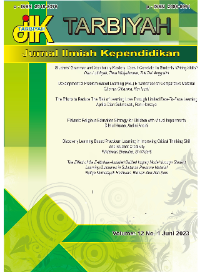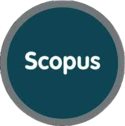Analysis of Students' Mastery of Mathematical Concepts Material for Linear Equations in Two Variables
DOI:
https://doi.org/10.18592/tarbiyah.v12i2.11070Keywords:
concepts, linear equations in two, mastery of mathematical , variablesAbstract
Mathematics learning still experiences several problems. It is still found that students have difficulty defining mathematics subject matter in their own sentences. Students also often do not know the actual applications and examples of the concepts they know. Students' ability to understand/master mathematical concepts is still low. This article aims to describe students' mastery of mathematical concepts regarding Linear Equations in Two Variables as well as efforts to improve students' mastery of mathematical concepts. This research includes qualitative research. Data collection techniques use interviews, observation, test questions, and documentation. The research results showed that students still had not mastered mathematical concepts in the material Linear Equations in Two Variables. This can be seen in students who struggle to memorize formulas and calculation processes involving large numbers. Apart from that, students do not yet understand defining concepts in writing and identify and create examples and non-examples related to the material. The efforts made to improve students' concept mastery abilities include teachers maximizing their role in the learning process and understanding various learning models that stimulate students' ability to learn with careful teaching planning by the teacher.References
Afriliziana, L. A., & Kartini. (2021). Analysis Of Students' Ability To Understand Mathematics Concepts For Class VIII SMP/MTS. (JIML) Journal of Innovative Mathematics Learning, Volume 4, No. 2, 49-62.
Aningsih, & Asih, T. S. (2017). Analisis Kemampuan Pemahaman Konsep Matematika Ditinjau dari Rasa Ingin Tahu Siswa pada Model Concept Attainment. Unnes Journal of Mathematics Education Research, 6(2), 217 - 224.
Aruan, N. F., Panjaitan, D. F., Aruan, A. F., & Manik, E. (2022). Pengaruh Model Pembelajaran Contextual Teaching and Learning (CTL) Terhadap Pemahaman Konsep Matematika Siswa Kelas VII SMP. SEPREN: Journal of Mathematics Education and Applied, 16-25.
Atmaja, I. M. (2021). Koneksi Indikator Pemahaman Konsep Matematika Dan Keterampilan Metakognisi. NUSANTARA: Jurnal Ilmu Pengetahuan Sosial, 2048-2056.
Ghassani, D., Kurniasih, & Fitriani, A. D. (2019). Penerapan Pendekatan Ctl Untuk Meningkatkan Pemahaman Konsep Matematis Siswa Kelas V Sd. Jurnal Pendidikan Guru Sekolah Dasar, 91-99.
Harja, M. (2017, Desember Senin). -. Retrieved from mediaharja.blogspot.co.id: http://mediaharja.blogspot.co.id/2012/04/tugas-matematika.html
Hoiriyah, D. (2019). Analisis Kemampuan Pemahaman Konsep Matematis Mahasiswa. Logaritma: Jurnal Ilmu-ilmu Pendidikan dan Sains, 7(01), 123-136.
Johnson, E. B. (2011). Contextual Teaching and Learning: Menjadikan Kegiatan Belajar-Mengajar Mengasyikkan dan Bermakna. Bandung: Kaifa.
Kesumawati, N. (2008). Pemahaman Konsep Matematik dalam Pembelajaran Matematika. Semnas Matematika dan Pendidikan Matematika (pp. 229-235). Palembang: FKIP Program Studi Pendidikan Matematika IKIP Palembang.
Klorina, M. J., & Prabawanto, S. (2023). Kemampuan Pemahaman Konsep Matematis Siswa dalam Menyelesaikan Soal Bentuk Aljabar. AKSIOMA: Jurnal Program Studi Pendidikan Matematika, 12(2), 1714-1727.
Lukitanto, A. M., & A, P. (2010). Upaya Meningkatkan Penguasaan Konsep Matematika dengan Pembelajaran Konstruktif Berbantuan LKS pada Siswa Kelas VII di MTs Negeri Cepogo Kabupaten Boyolali. Makasar: Desentralized Basic Education 3 USAID.
Masykur, M., & Fathani, A. H. (2009). Mathematical Intelligence. Jogjakarta: Ar-Ruzz Media.
Muchtar, F. Y., Nurdin, F. A., Kasmawati, Nurwahyuningsih, Yamin, M., & S, M. I. (2023). Meningkatkan Hasil Belajar Matematika Peserta Didik Sekolah Dasar Melalui Model Pembelajaran Contextual Teaching and Learning (CTL). Journal on Education, 5(4), 14615-14624.
Murizal, A., Yarman, & Yerizon. (2012). Pemahaman Konsep Matematis dan Model Pembelajaran Quantum Teaching. Jurnal Pendidikan Matematika, 1 (1), 19-23.
Muthma'innah, M. (2017). What’s about Peer Tutoring Learning Model? International Conference on Mathematics and Science Education (ICMScE) (pp. 1-6). Bandung: IOP Publishing,IOP Conf. Series: Journal of Physics: Conf. Series 895 (2017) 012064.
Muthma'innah, M., Dahlan, J. A., & Suhendra, S. (2019). Ability of mathematical critical thinking – what about Learning Cycle 7E model? International Conference on Mathematics and Science Education (ICMScE 2018) (pp. 1-7). Bandung: IOP Publishing, IOP Conf. Series: Journal of Physics: Conf. Series 1157 (2019) 032129.
Nasirudin, A., Rahmawati, I., & Suyitno. (2019). Keefektifan Model Contextual Teaching And Learning (CTL) Terhadap Hasil Belajar Matematika Materi Pecahan. Journal for Lesson and Learning Studies, 150-159.
Nasution, E. Y., Fitrianti, A., & Erita, S. (2021). Analisis Terhadap Kemampuan Pemahaman Konsep Matematis Siswa Pada Materi Sistem Persamaan Linear Dua Variabel (SPLDV). de Fermat: Jurnal Pendidikan Matematika Vol. 4, No. 2, 125-137.
Novianti, & Priatna, B. A. (2019). Students’ difficulties analysis in solving systems of linear equations in two variables. 1st International Seminar STEMEIF (pp. 56-61). Purwokerto: STEMEIF (Science, Technology, Engineering and Mathematics Learning International Forum), ISBN: 978-602-6697-36-3.
Putri, C. N., & Hakim, D. L. (2022). Kemampuan Pemahaman Konsep Matematis Siswa Kelas XII pada Materi Program Linier. Jurnal Pembelajaran Matematika Inovatif, 5(6), 1573-1580.
Radiusman. (2020). Studi Literasi: Pemahaman Konsep Siswa pada Pembelajaran Matematika. FIBONACCI : Jurnal Pendidikan Matematika dan Matematika, 6(1), 1-8.
Santoso, T., & Supriadi. (2014). Pembelajaran Penalaran Argumen Berbasis Peta Konsep untuk Meningkatkan Pemahaman Konsep Kimia. Prosiding Seminar Nasional Kimia (pp. 134-143). Surabaya: Jurusan Kimia FMIPA Universitas Negeri Surabaya.
Sari, D. A., Rahayu, C., & Widyaningrum, I. (2018). Pembelajaran Matematika Menggunakan Model Contextual Teaching and Learning (CTL) Pada Materi Kubus Dengan Konteks Tahu di Kelas VIII. Journal of Dedicators Community UNISNU Jepara, 108-115.
Sa'ud, U. S. (2009). Inovasi Pendidikan. Bandung: Alfabeta.
Suraji, Maimunah, & Saragih, S. (2018). Analisis Kemampuan Pemahaman Konsep Matematis dan Kemampuan Pemecahan Masalah Matematis Siswa SMP pada Materi Sistem Persamaan Linear Dua Variabel (SPLDV). Suska Journal of Mathematics Education, 4(1), 9-16.
Umam, M. A., & Zulkarnaen, R. (2022). Analisis Kemampuan Pemahaman Konsep Matematis Siswa Dalam Materi Sistem Persamaan Linear Dua Variabel. Jurnal Educatio, 8(1), 303-312.
Wijaya, T. U., Destiniar, & Mulbasari, A. S. (2018). Kemampuan Pemahaman Konsep Matematis Siswa Dengan Menggunakan Model Pembelajaran Auditory Intellectually Repetition (Air). Prosiding Seminar Nasional 21 Universitas PGRI Palembang (pp. 431-435). Palembang: UNIVERSITAS PGRI PALEMBANG.
Yuliani, E. N., Zulfah, & Zulhendri. (2018). Kemampuan Pemahaman Konsep Matematis Siswa Kelas VIII SMPN 1 Kuok Melalui Model Pembelajaran Koopearatif Tipe Group Investigation. Jurnal Cendekia: Jurnal Pendidikan Matematika, 91-100.
Yuliati, F. (2014). Meningkatkan Penguasaan Konsep Bilangan pada Anak Tunarungu Melalui Permainan Dakhon. Jurnal Manajemen Pendidikan, 9 (2), 129-140.
Zulkarnain, I., & Budiman, H. (2019). Pengaruh Pemahaman Konsep Terhadap Kemampuan Pemecahan Masalah Matematika. Research and Development Journal Of Education, 6(1), 18-27.
Downloads
Published
How to Cite
Issue
Section
License
Copyright (c) 2024 M Muthmainnah

This work is licensed under a Creative Commons Attribution 4.0 International License.
Authors retain copyright and grant the journal right of first publication with the work simultaneously licensed under a Creative Commons Attribution 4.0 International License that allows others to share the work with an acknowledgment of the work's authorship and initial publication in this journal.




